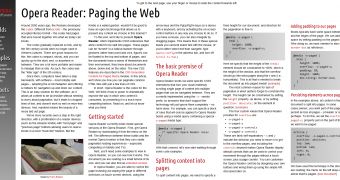Opera is working on making the web more like a book or a magazine. It's hardly the first of course, but Opera is going about it as it always had, by creating a new technology or adding to existing standard ones.
The result is Paged Media, a way of laying out online content in a fashion similar more to books, or rather magazines and newspapers. Articles are split into columns, for example, and are horizontally stretched out rather than vertically.
This replaces the need for the ugly scrollbar and also makes the whole experience a lot more interesting and pleasant on tablets and other devices. It could be a whole new way of reading long-form content on your laptop or desktop as well.
All of this is achieved via CSS3 which gets a few additions specific to this layout. Everything is highly experimental and fresh, but Opera has already debuted a testing version of its browser with support for Paged Media.
No other browser supports the CSS extensions and probably won't any time soon, unless the feature proves its worth. But it is an interesting addition.
"We are very excited to give you a first look at how a browser can split content into native pages," Opera wrote.
"This proof of concept implements CSS3 extensions to split content into pages that can be 'turned' in a natural manner through gestures rather than point and click, control the positioning/floating of figures in multi-column layouts more precisely and provide a consistent navigation system for such content that is independent of your documents," it explained.
You can check out the video below, featuring the creator of the Paged Media Håkon Wium Lie, for an explanation of how this works and how it looks.
The technology has the potential to change the way, at least some, content on the web is displayed and it should be interesting to see whether other browser makers and actual websites start deploying it.

 14 DAY TRIAL //
14 DAY TRIAL // 